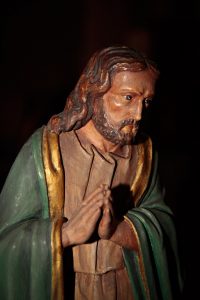I wanted to share an important statement, issued on June 1, 2017, from the Presiding Bishop of the Episcopal Church, the Most Reverend Michael B. Curry. I also want to share a few things about Bishop Curry himself.
Presiding Bishop’s Statement on President Donald Trump’s Action on the Paris Climate Accord
With the announcement by President Donald Trump of his decision to withdraw the commitment made by the United States to the Paris Climate Accord, I am reminded of the words of the old spiritual which speaks of God and God’s creation in these words, “He’s got the whole world in his hands.” The whole world belongs to God, as Psalm 24 teaches us. God’s eye is ever on even the tiny sparrow, as Jesus taught and the song says (Luke 12:6). And we human beings have been charged with being trustees, caretakers, stewards of God’s creation (Genesis 1:26-31). 
The United States has been a global leader in caring for God’s creation through efforts over the years on climate change. President Trump’s announcement changes the U.S.’s leadership role in the international sphere. Despite this announcement, many U.S. businesses, states, cities, regions, nongovernmental organizations and faith bodies like the Episcopal Church can continue to take bold action to address the climate crisis. The phrase, “We’re still in,” became a statement of commitment for many of us who regardless of this decision by our President are still committed to the principles of the Paris Agreement.
Faith bodies like the Episcopal Church occupy a unique space in the worldwide climate movement. In the context of the United Nations, the UNFCCC and the Paris Agreement, we are an international body representing 17 countries in the United States, Latin America and the Caribbean, Europe, and Asia and the Pacific. We also are an admitted observer organization to the UNFCCC process, empowered to bring accredited observers to the UN climate change meetings. Furthermore, the Episcopal Church is a member of the worldwide Anglican Communion, the third-largest Christian tradition, and we remain committed to ensuring that Anglicans everywhere are empowered to undertake bold action on climate change mitigation and adaptation.
We know that caring for God’s creation by engaging climate change is not only good for the environment, but also good for the health and welfare of our people. The U.S. is currently creating more clean jobs faster than job creation in nearly every other sector of the economy, and unprecedented acceleration in the clean energy sector is also evident in many other major economies.
 My prayer is that we in the Episcopal Church will, in this and all things, follow the way, the teachings and the Spirit of Jesus by cultivating a loving, liberating and life-giving relationship with God, all others in the human family, and with all of God’s good creation.
My prayer is that we in the Episcopal Church will, in this and all things, follow the way, the teachings and the Spirit of Jesus by cultivating a loving, liberating and life-giving relationship with God, all others in the human family, and with all of God’s good creation.
In spite of hardships and setbacks, the work goes on. This is God’s world. And we are all his children. And, “He’s got the whole world in his hands.”
A Short Bio of the Presiding Bishop
Bishop Curry is the first African American elected Presiding Bishop of the Episcopal Church. He was elected at the denomination’s General Convention on June 27, 2015, and he succeeded the church’s first female Presiding Bishop, Katharine Jefferts Schori. The Episcopal Church has been known in recent decades for its progressive stances on LBGTQ rights, racial reconciliation, women’s ordination, eco-justice, refugees and poverty.
Bishop Curry was born in Chicago, attended public schools in Buffalo, New York, and graduated with high honors from Hobart College in Geneva, New York. He received a Master of Divinity degree in 1978 from Yale University Divinity School in New Haven, Conn., and continued his education at The College of Preachers, Princeton Theological Seminary, Wake Forest University, the Ecumenical Institute at St. Mary’s Seminary, and the Institute of Christian Jewish Studies.
Presiding Bishop Curry was ordained to the diaconate in June 1978 in Buffalo, NY, and to the priesthood in December 1978 in Winston-Salem, NC. (Significantly, he was ordained to the priesthood by the Rt. Rev. John M. Burgess, who, as the twelfth bishop of the Episcopal Diocese of Massachusetts from 1970 to 1975, was the first African American to head an Episcopal diocese.) Curry served as rector in Winston-Salem, NC, Lincoln Heights, Ohio, and Baltimore, Maryland. While serving in Baltimore, he was elected the 11th Bishop of the Episcopal Diocese of North Carolina in February 2000.
Throughout his ministry, Presiding Bishop Curry has been active in issues of social justice. In his three parish ministries in North Carolina, Ohio, and Maryland, according to his official biography, Presiding Bishop Curry had “extensive involvement in Crisis Control Ministry, the founding of ecumenical summer day camps for children, preaching missions, the Absalom Jones initiative, creation of networks of family day care providers, creation of educational centers, and the brokering of millions of dollars of investment in inner city neighborhoods. In the Diocese of North Carolina, Presiding Bishop Curry instituted a network of canons, deacons, and youth ministry professionals dedicated to supporting the ministry that happens in local congregations. He refocused the Diocese on The Episcopal Church’s Millennium Development Goals through a $400,000 campaign to buy malaria nets that saved over 100,000 lives.”
The Episcopal Church in the US is fortunate to have Michael Curry in the Presiding Bishop role, and we thank him for his courageous and prophetic service.
